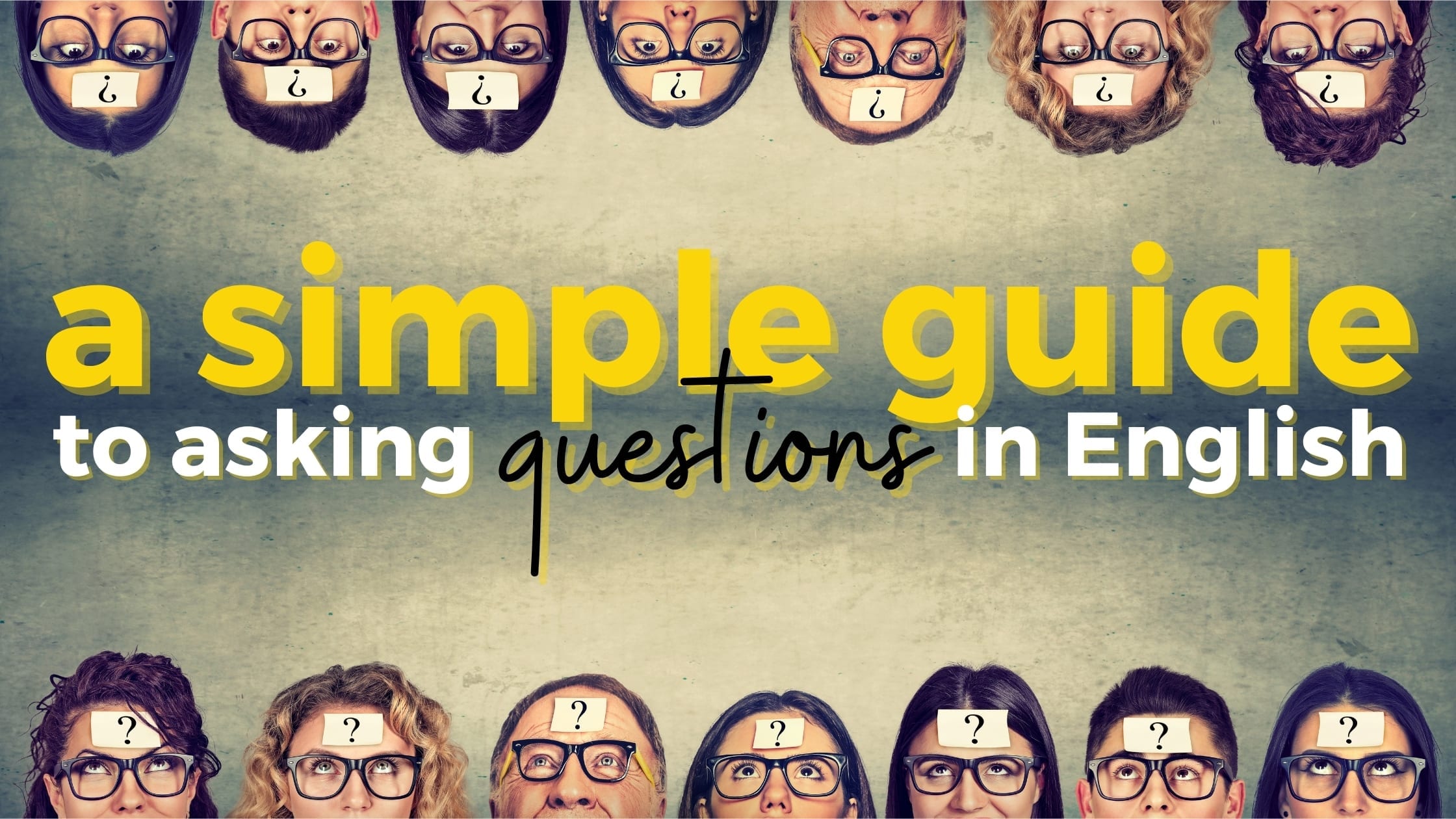Asking Questions in English: a Simple Guide with 35+ Examples
You ask questions all the time. You may need directions to get somewhere, permission to do something, or an opinion before buying a new piece of clothing. The thing is: learning how to ask questions in English is necessary for any ESL student! It is even more important that you can form questions in English correctly. This article teaches you everything you need to know about asking questions in English. Keep reading for examples of questions and answers using the WH question words, the verb to be, and more. You can even download our free ebook for future reference!
How to form questions in English
In English, information questions depend on using specific words — these are what we call WH question words. We have nine WH question words: what, when, where, which, who, why, whom, whose, and how.
Some questions are formed with adverbs. These ask for information about time, place, reason, or manner. The four words which function as adverbs are: when, where, why, and how. Adverbs describe a verb or an adjective. Think about this example: where did you read that? In this sentence, where is asking from what source did the information come. Other questions are formed with pronouns. These ask about people or things. The five words that are pronouns are: what, which, who, whom, and whose.
With most questions, you can use the following structure to form them properly. The first structure is for the verb ‘to be.’ The second structure is for all other verbs.
| Questions using ‘to be’ | Questions using other verbs |
| Question word + to be + subject + complement (optional) | Question word + auxiliary verb + subject + base verb + complement |
| Where is your house? | Where do you live? |
| How is the food? | How do you like the food? |
| Who is that girl? | Who do you know? |
| When is your birthday? | When do you work? |
In many questions with pronouns, the question word functions as a subject. Think of the question ‘who sings that song?’ The subject is ‘who’ and ‘sing’ is the verb. ‘That song’ is the object. This is important because occasionally, questions that start with a pronoun will not use an auxiliary verb. Look at this example:
- Who sings that song? (
who does sing that song?) - Whose child made that? (
whose child did make that?)
The WH words explained
Now let’s take a look at each of the question words we mentioned before. We will explain the situations in which we use each of them and we will also give some examples of questions and answers we can have when using those question words.
What
We use ‘what’ to ask for specific information about something. Here are a few examples of questions and answers.
- What is your mother’s name? Her name is Lisa.
- What time is it? It’s half past four.
- What are you doing now? I’m watching TV.
When
‘When’ is used to ask questions about time. Here are a few examples of questions and answers.
- When will Julie arrive at the airport? She will arrive around 1 p.m.
- When can I pick you up from school? I will be ready at 3 p.m.
- When is his birthday? His birthday is October 30.
Where
We use ‘where’ to ask something about a place or the position of something. Here are a few examples of questions and answers.
- Where is my phone? I think it’s on the table.
- Where is Paris? Paris is located in France.
- Where will you travel to next summer? I’m thinking about going to the Bahamas.

Which
We will use ‘which’ whenever we have options to choose from. Here are a few examples of questions and answers.
- Which pizza did you order: the pepperoni or the Margherita? I ordered the pepperoni pizza.
- Which Harry Potter character is your favorite? Hermione is my favorite!
- Which do you prefer: the red coat or the brown one? I prefer the brown one.
Who
‘Who’ is used to ask questions about someone who is the subject of a sentence, that is, someone who does an action. Here are a few examples of questions and answers.
- Who is that guy? Oh, that’s Adam. He’s a friend of mine.
- Who are you visiting this weekend? I’m visiting my grandma.
- Who is your best friend? My best friend is Laura.
Whom
‘Whom’ is used to ask questions about someone who is the object of a sentence, that is, someone who receives an action. Here are a few examples of questions and answers.
- Whom do you believe? I believe in Tom.
- Whom are you going to invite? I am going to invite Sam and Michael.
- From whom did you get this information? I got it from Joanna.
Whose
We use ‘whose’ to ask questions about something that belongs to someone. Here are a few examples of questions and answers.
- Whose car is this? I think it is John’s car.
- Whose umbrella did you take? I took my sister’s umbrella.
- Whose book is this? It’s Michael’s book.
Why
‘Why’ is used to ask about a reason, an explanation. Here are a few examples of questions and answers. It is common to answer a ‘why’ question with ‘because’.
- Why are you sad? Because I’m having some problems at home. Don’t worry!
- Why is she traveling alone? Because her husband is sick.
- Why were you late to the meeting? Because my alarm didn’t go off. I’m sorry.
How
‘How’ is used to ask about manner, condition, or quality.
- How far: ask about distance
How far is your hometown?
Not very far, it’s about 50 km from here.
- How long: ask about length (time or space)
How long have you been dating Taylor?
We have been dating for two months.
- How many: ask about the quantity of countable nouns
How many books do you have?
I guess I have about 100 books.
- How much: ask about the quantity of uncountable nouns
How much coffee did you make?
There’s enough for two cups.
- How old: ask about age
How old is your brother?
He is 21 years old.
Other tips
Besides the WH question words, there are other ways to ask questions in English. Keep reading for explanations and examples.
Yes or no questions with ‘to be’
We can ask yes or no questions with the verb ‘to be’. To do this, we need to invert the order of the affirmative sentence we create with the verb ‘to be’. Check out the table below
| Affirmative sentences with the verb ‘to be’ | Questions with the verb ‘to be’ | Possible answers |
| I am old. | Am I old? | Yes, you are No, you aren’t |
| She is young He is young It is young | Is she young? Is he young? Is it young? | Yes, (he/she/it) is. No, (he/she/it) isn’t. |
| We are happy. They are happy. You are happy. | Are we happy? Are they happy? Are you happy? | Yes, (they, we, you) are. No, (they, we, you) aren’t. |
Future and past tenses
In order to create questions using the future tense, we will use the structure below. It is common to add an expression of future time at the end of the sentence, such as ‘tomorrow’, ‘next’ (next week, next year, next Monday, etc), ‘from now’ (two days from now, one week from now, etc).
Will/Won’t + subject + base form of the verb + complement
Examples:
- Will she go to Germany tomorrow? Yes, she will.
- Won’t they go to the party with you? No, they won’t.
When it comes to forming questions in English using the simple past, we will use the auxiliary verb ‘did’. It is common to add an expression that indicates the past, such as ‘yesterday’, ‘last’ (last week, last year, last Tuesday, etc), ‘ago’ (two years ago, three days ago, one week ago, etc) at the end of the sentence. The structure is the following:
Did/Didn’t + subject + base form of the verb + complement
Examples:
- Did she go to the party last week? Yes, she did.
- Didn’t they call you last night? No, they didn’t.
Common mistakes
The most common mistake students make is forgetting the auxiliary verbs, such as ‘do’, ‘did’, and ‘will’. Sometimes they confuse these verbs and use the wrong one or put them in the wrong order. In order to avoid that, you should study the structures we presented to you today and practice using them. We offer free conversation classes at PrepEng.com and you can sign up for those classes here.
Intonation
Intonation is how we call the way our voices rise and fall when we are talking. Whenever you are asking a yes or no question, it is common to use rising intonation, which means your voice rises at the end of the sentence.
Examples:
- Do you work?
- Are you hungry?
Falling intonation describes how the voice falls on the final stressed syllable of a sentence. It is common in questions that use the WH words.
Examples:
- When are you going home?
- Why did you leave?
You are now ready to be asking questions in English about anything. I’m sure you will soon memorize all the WH question words and use them correctly. If you have any doubts, let us know in the comment section! I know you will have no problems forming those questions in English, right?

